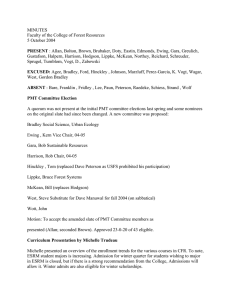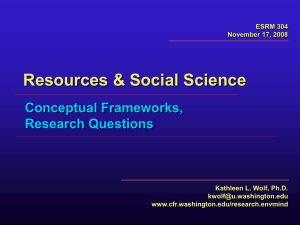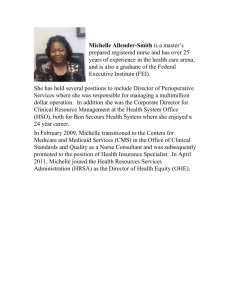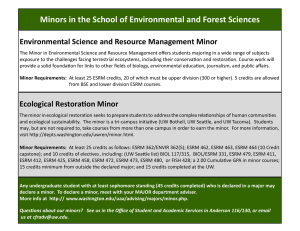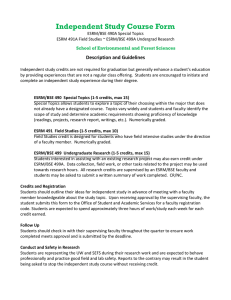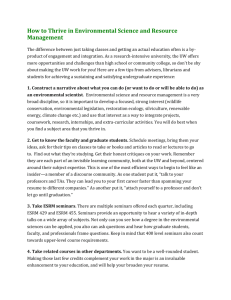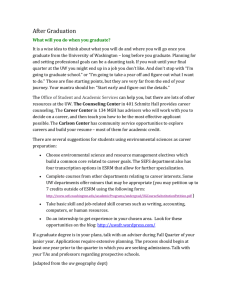CFR FACULTY MEETING MINUTES
advertisement
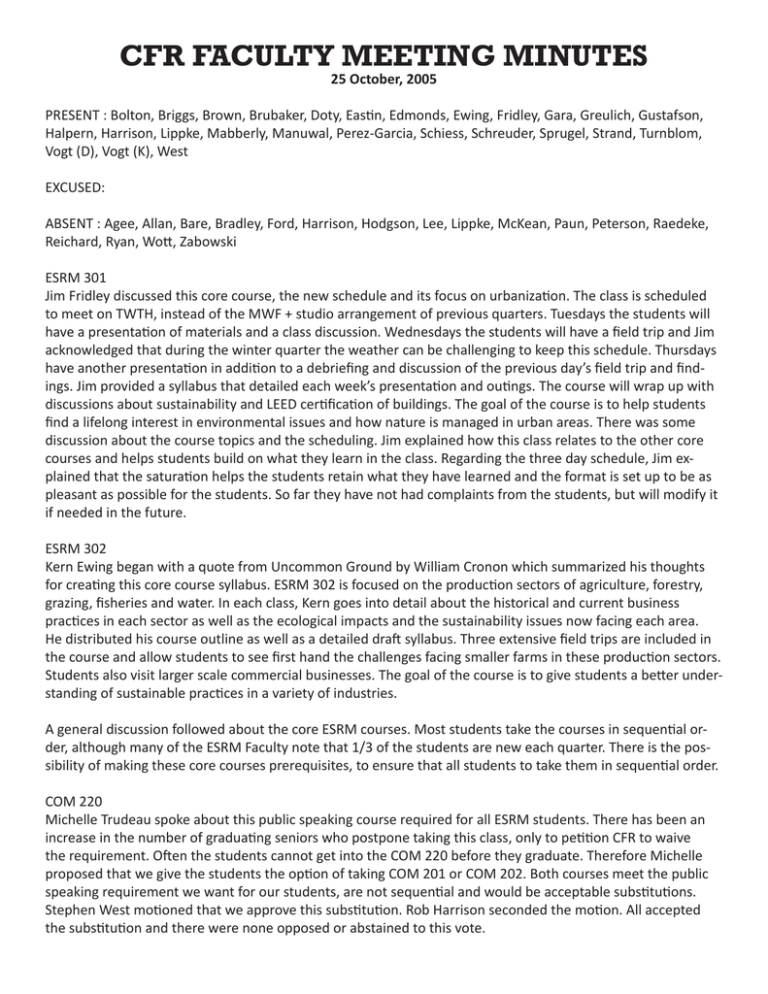
CFR FACULTY MEETING MINUTES 25 October, 2005 PRESENT : Bolton, Briggs, Brown, Brubaker, Doty, Eastin, Edmonds, Ewing, Fridley, Gara, Greulich, Gustafson, Halpern, Harrison, Lippke, Mabberly, Manuwal, Perez-Garcia, Schiess, Schreuder, Sprugel, Strand, Turnblom, Vogt (D), Vogt (K), West EXCUSED: ABSENT : Agee, Allan, Bare, Bradley, Ford, Harrison, Hodgson, Lee, Lippke, McKean, Paun, Peterson, Raedeke, Reichard, Ryan, Wott, Zabowski ESRM 301 Jim Fridley discussed this core course, the new schedule and its focus on urbanization. The class is scheduled to meet on TWTH, instead of the MWF + studio arrangement of previous quarters. Tuesdays the students will have a presentation of materials and a class discussion. Wednesdays the students will have a field trip and Jim acknowledged that during the winter quarter the weather can be challenging to keep this schedule. Thursdays have another presentation in addition to a debriefing and discussion of the previous day’s field trip and findings. Jim provided a syllabus that detailed each week’s presentation and outings. The course will wrap up with discussions about sustainability and LEED certification of buildings. The goal of the course is to help students find a lifelong interest in environmental issues and how nature is managed in urban areas. There was some discussion about the course topics and the scheduling. Jim explained how this class relates to the other core courses and helps students build on what they learn in the class. Regarding the three day schedule, Jim explained that the saturation helps the students retain what they have learned and the format is set up to be as pleasant as possible for the students. So far they have not had complaints from the students, but will modify it if needed in the future. ESRM 302 Kern Ewing began with a quote from Uncommon Ground by William Cronon which summarized his thoughts for creating this core course syllabus. ESRM 302 is focused on the production sectors of agriculture, forestry, grazing, fisheries and water. In each class, Kern goes into detail about the historical and current business practices in each sector as well as the ecological impacts and the sustainability issues now facing each area. He distributed his course outline as well as a detailed draft syllabus. Three extensive field trips are included in the course and allow students to see first hand the challenges facing smaller farms in these production sectors. Students also visit larger scale commercial businesses. The goal of the course is to give students a better understanding of sustainable practices in a variety of industries. A general discussion followed about the core ESRM courses. Most students take the courses in sequential order, although many of the ESRM Faculty note that 1/3 of the students are new each quarter. There is the possibility of making these core courses prerequisites, to ensure that all students to take them in sequential order. COM 220 Michelle Trudeau spoke about this public speaking course required for all ESRM students. There has been an increase in the number of graduating seniors who postpone taking this class, only to petition CFR to waive the requirement. Often the students cannot get into the COM 220 before they graduate. Therefore Michelle proposed that we give the students the option of taking COM 201 or COM 202. Both courses meet the public speaking requirement we want for our students, are not sequential and would be acceptable substitutions. Stephen West motioned that we approve this substitution. Rob Harrison seconded the motion. All accepted the substitution and there were none opposed or abstained to this vote. Streamside Minor Michelle Trudeau discussed the modification and adoption of a new Streamside Studies Minor. Many students come into the Office of Student and Academic Services for advising and are surprised to learn that they can easily declare this minor. Michelle distributed the proposed changes to the required core courses and the thematic areas of the minor for Faculty review. Michelle also reminded everyone that these changes allow for civil engineering students to complete a minor within the college. She asked for the Faculty to approve this new minor with the changes. David Manuwal motioned to approve. David Briggs seconded the motion. All voted in favor of the updated minor with the exception of one abstaining vote. RA/TA process As there was not enough time for Naomi Wilson to discuss the new procedural changes in the RA and TA hiring process, this was postponed for another meeting. Naomi did mention that the forms are simplified and many are now combined which should make the process easier for everyone. Additionally, job descriptions will be online. She will send out information via email at a future date regarding the new union rules and the new UW process. Rick added that the goal is to make this process smooth and clear for all of the faculty as well as the administration handling the paperwork. Late Announcement David Mabberly asked everyone to make note that on the 30 th of November, from 5:15-7pm, there will be an open house at the UWBG. There will be a discussion “What Does Society Want in a Modern Botanic Garden?” during this time. He encouraged everyone to attend and to tell others about this event. Adjourned 11:25 am
